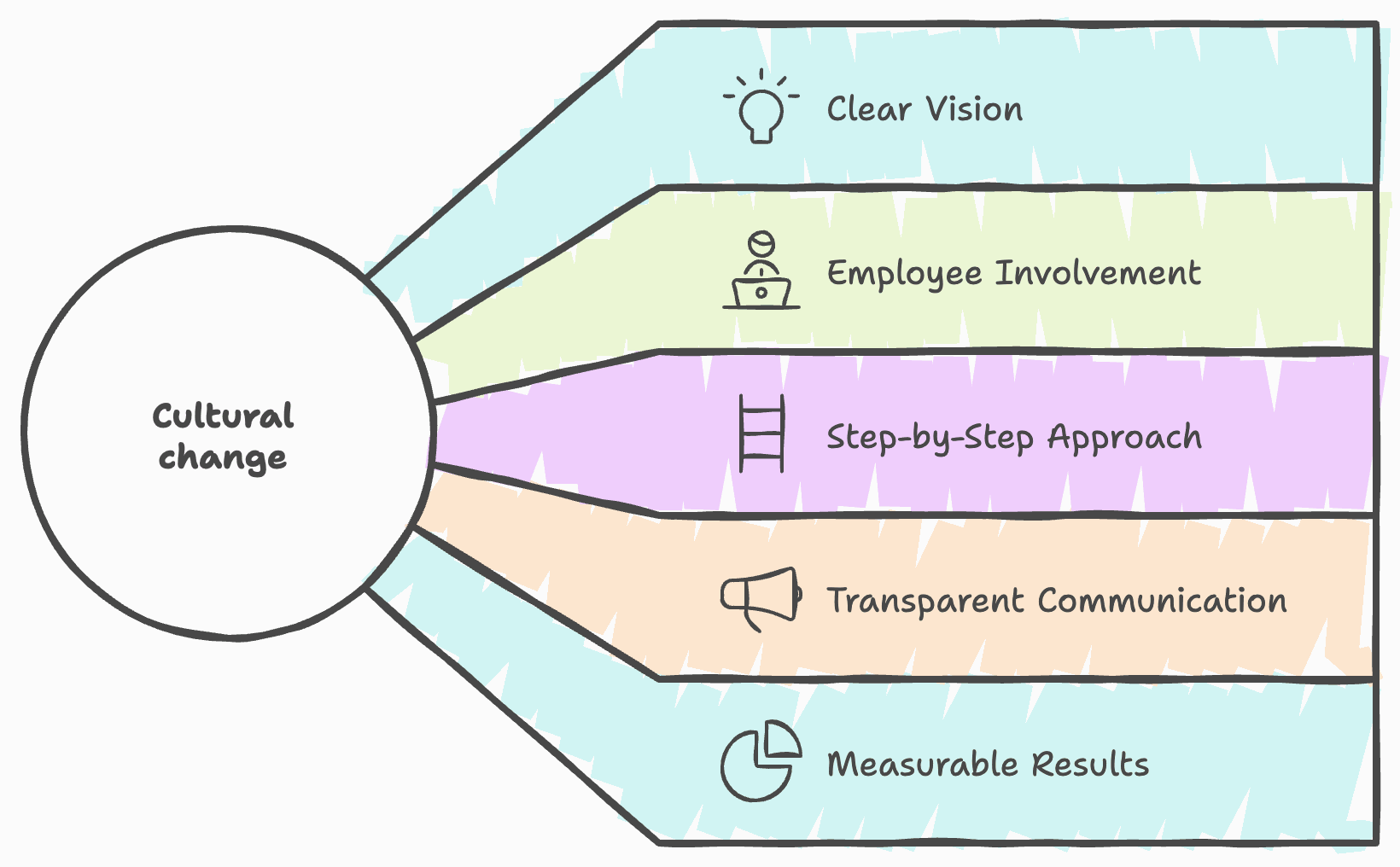Performance
Shaping a positive corporate culture
A positive corporate culture is individual and tailor-made - there is no universal blueprint for it. It is the result of the systemic circumstances of an organization and the proven behaviors of its employees. To survive in dynamic markets, we recommend creating a culture that is responsive, open and resilient, where error culture is encouraged and employees feel safe to contribute new ideas. These organizational capabilities not only help respond to dynamic market demands, but also strengthen collaboration and employee engagement of employees.

What is corporate culture?
Corporate culture describes the values, norms and behaviors that shape the daily actions and thinking in a company. It is determined by the way in which decisions are made and problems are solved. In addition, corporate culture always encompasses the interaction between employees.
Why is culture important?
A strong corporate culture is important because it promotes cooperation, strengthens employee commitment and increases identification with the company. It creates a shared understanding of what is important in the company and how goals are achieved. Companies with a positive, clearly defined culture are often more successful because their employees are more motivated and satisfied.

Challenges of cultural change
Cultural change is complex because it affects deeply rooted behavioral patterns and beliefs. It is not enough to design a poster with new values and principles of cooperation and expect employees to change from the ground up after a presentation by managers. Many change projects fail precisely because of this approach. People need a comprehensible reason and urgency to change. It is a key management task to clearly communicate the motivation and intention behind the change, rather than simply drafting new value posters or prescribing rules of conduct.
Instead of actively involving employees step by step in shaping the change and gaining initial advocates, the change is often first presented at large events. This leads to a critical mass of resistance because most employees have not been emotionally and mentally prepared for the change. They feel ignored, not taken seriously and perceive the change as being dictated from above. Such top-down approaches are often met with rejection as they are perceived as being externally controlled. Employees must be involved in the change process at an early stage in order to gain advocates for the change at all levels of the company.
Cultural changes are also difficult to measure. The mistake is often made of only reviewing the impact of the change measures months or years later. Instead of building trust through small, measurable steps and consolidating the change, the workforce remains in the dark as to whether the change is actually working. Without visible progress and open communication, motivation wanes and skeptics feel confirmed in their stance. This makes it harder to gain new supporters and resistance continues to grow. Change stagnates because small successes are not used to generate momentum and promote acceptance.
How does cultural change work?
Cultural change is a long-term and iterative process that relies on targeted measures and the active involvement of employees. A central approach to this is lean change, which enables change through small, controlled steps and integrates continuous feedback. Instead of imposing large, one-off transformations, lean change offers the flexibility to shape change gradually and in line with the actual needs and reactions of employees.
The following key factors are crucial to successfully mastering cultural change:
.png)
- Clear vision and urgency: Cultural change must be linked to a compelling vision and a clear purpose. Leaders play a critical role in communicating the urgency and ensuring that employees understand the purpose and benefits of the change.
- Early involvement of employees: Early and active involvement of employees promotes acceptance. By involving them as co-designers in the process, initial advocates can be won who support the change from within and reduce skepticism.
- Step-by-step approach: Changes should be introduced in small, easily measurable steps. This allows the measures to be reviewed regularly and creates the opportunity to adapt the change flexibly. Early successes and visible progress increase staff confidence in the process.
- Transparent communication and feedback: Continuous, open communication is crucial in order to avoid uncertainty and make change comprehensible for everyone. Regular feedback loops ensure that the measures are in line with both the company's goals and the needs of the employees.
- Measurable results: The impact of the change measures must be reviewed regularly. Clear indicators and key figures help to make successes visible and strengthen motivation within the team. This supports the process and helps to consolidate long-term changes.
By taking these factors into account, cultural change can be shaped sustainably and aligned with the goals of the company and the needs of the workforce. We are happy to support you in orchestrating your change and achieve tangible success together
Contact us or make an appointment. We are Timo Foegen, Yvonne Fischer, Tina Eisoldt, Daniel Votta and Lutz Koch. We look forward to supporting your company.
You are also welcome to take a look at our success stories.
Take a look at our success stories and discover how wibas has successfully shaped cultural change in various projects. Be inspired by practical examples!
High performing organizations
The ability to deliver and customer focus are crucial characteristics for the success of any company. When teams and departments work together reliably and effectively, products and services are delivered on time. Read here which building blocks are relevant for this.
Leading High Performing Organizations
Organizations in today's world need leaders who create the framework for delivery capability and customer orientation. In this training course, you will develop your leadership skills for a modern organization in a complex world.
Masterclass Deliverable Organization
Do you use agile approaches or agile scaling in your company and are now looking for a suitable organizational design as a structure and framework? Then this Masterclass Deliverable Organizational Design is just right for you!
When working harder is not the solution ...
In the modern business world, where speed and efficiency are critical, leaders are often looking for ways to push their teams to higher [...]
What is an agile mindset?
An agile mindset is the cultural basis for an agile organization. On the way from a traditional to an agile organization, not only agile methods are important, but also a cultural change towards a more agile mindset.
Your contact person:
Mark Kepler
